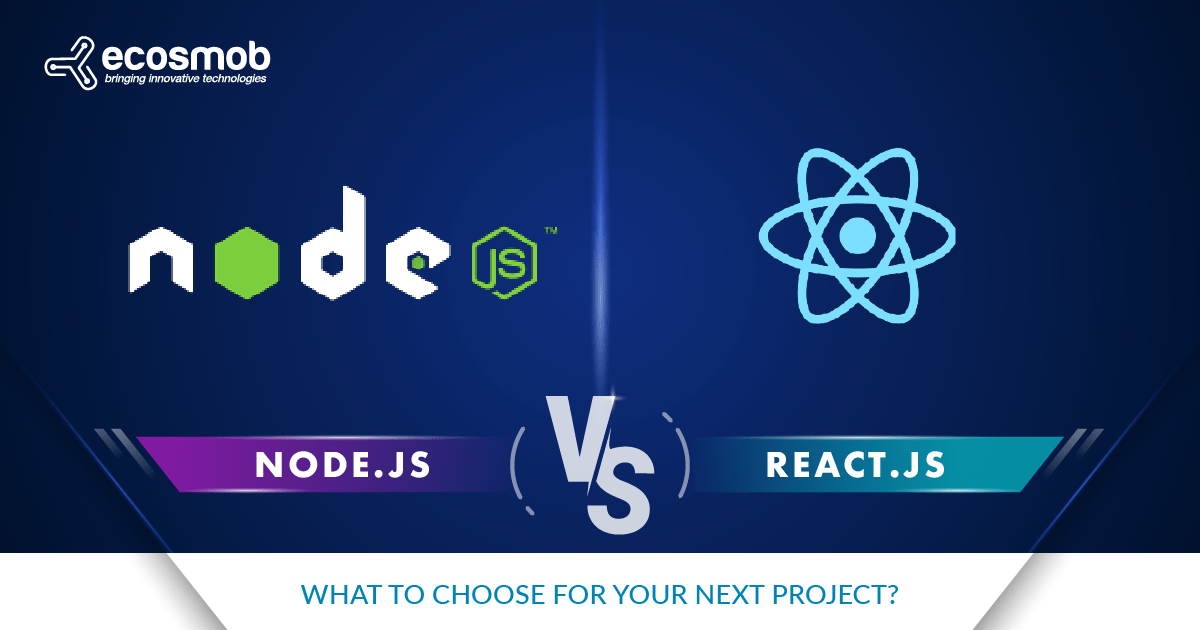JavaScript is one of the most popular and commonly used programming languages among software developers around the world. About 68% of developers use JavaScript for software development.
Node.JS and React.JS are two of the widely used technologies out there in the software development market. However, many developers get confused when it comes to deciding which one is better. The key difference between both these technologies is that the Node.Js is a back-end framework, whereas React.Js is used for creating an outstanding user interface.
Let’s look at both these technologies in detail:
All about Node.JS
Node.JS is an open-source server platform built on Google Chrome’s JavaScript Engine (V8 Engine). Utilized for building quick and scalable network applications, it uses an event-driven, non-blocking I/O model that makes it more competent and perfect for data-intensive real-time applications. Node.JS applications are written in JavaScript and can run on various platforms including Windows, Linux, UNIX, Mac OS X, etc. With the help of superior Node.JS development services, companies can create real-time, function-rich, scalable web, and mobile applications.
Node.JS also comprises a rich library of assorted JavaScript modules that help to simplify the development of web applications.
Features of Node.JS
Some of the key features of Node.JS include:
- – It’s a free and open-source framework
- – Helps in improving web app performance
- – Comes with in-built and efficient APIs
- – Ability to execute non-blocking operations
- – Provide complete unit testing
- – Facilitate easy scalability
Advantages of Node.JS
- – Node.JS is easy to learn
- – Facilitate improved performance
- – Carry out easy development
- – Provide extended support for tools
- – Individual modules caching
- – Highly extensible
Disadvantages of Node.JS
- – The technology follows asynchronous programming instead of linear blocking I/O programming.
- – It lacks a rich library
What All Node.JS Can Do?
Various tasks that can be performed using Node.JS include:
- – It can be used to generate the dynamic page content.
- – With the help of Node.JS, developers can create, open, read, write, delete, and close files on the server.
- – Developers can add, delete, and modify data in the database by utilizing Node.JS.
All about React.JS
React.JS is an open-source front-end library that can be utilized by developers to build outstanding user interfaces for web pages and websites in a structured manner. It is a declarative, efficient, and flexible JavaScript library that allows composing complex UIs from small and isolated pieces of code, known as ‘components’.
React.JS not only provides a reliable platform to build incredible web app user interfaces but also helps in improving the website speed.
Features of React.JS
Some of the key features of React.JS include:
- – Provide code stability
- – Easy maintenance
- – A virtual document object model
- – Offers rich UI for native apps
- – Simple debugging and design tools
- – Support both front-end and server-side
Advantages of React.JS
- – Provide easy UI test cases
- – Facilitates reusable code components
- – Performs faster debugging
- – It supports both iOS & Android applications
- – Offer one-way data binding
- – Specialized chrome extension
Disadvantages of React.JS
- – React.JS is quite complex to learn using JSX and JavaScript.
- – Keeping up-to-date with the constant release of new tools and tech is difficult for developers
What All React.JS Can Do?
Various tasks that can be performed using React.JS include:
- – It allows the development of a dynamic library with high performance.
- – React can be used for everything from content-based websites such as The New York Times to apps like Twitter.
- – React is widely used by developers to build websites with a complex structure that might be hard to keep track of with a traditional approach.
- – As the application scales, React allows keeping track of all the interactions.
Which Technology to Choose Between Node.JS and React.JS for Web App?
Both Node.JS and React.JS are advanced technologies applied by several successful businesses. Depending upon your key requirements and type of project, you can opt for the most appropriate technology. For instance:
- If you are looking forward to building an advanced yet scalable server-side web application such as an online streaming platform, then Node.JS will be the best choice.
- If you like to build a project with varying states like dynamic inputs, buttons, and so on, then React.JS will be the perfect choice for your requirement.
You can even utilize both technologies for your web app. Using React.JS you can create the front-end of the web app. On the other hand, with the help of Node.JS, you can create the back-end. One can even Hire Node JS or React JS development services to get the most appropriate and customized solutions based on their project requirements.










